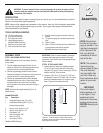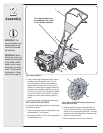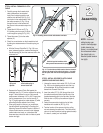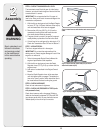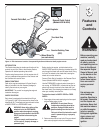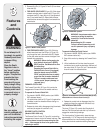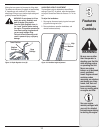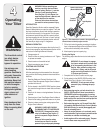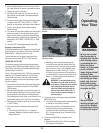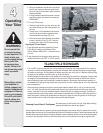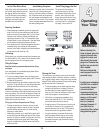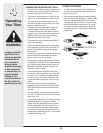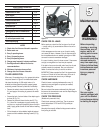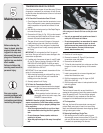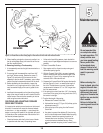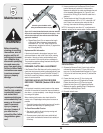
13
WARNING
4
Operating
Your Tiller
Be sure no one other
than the operator is
standing near the tiller
while starting engine
or operating the unit.
Never run engine
indoors or in enclosed,
poorly ventilated
areas. Engine exhaust
contains carbon
monoxide, an odorless
and deadly gas. Keep
hands, feet, hair and
loose clothing away
from any moving parts
on engine and tiller.
See your engine
manual packaged with
your unit for detailed
instructions pertaining
to starting the engine.
3. Move the Depth Regulator Lever all the way down to
the “travel” position, so that the tines clear the ground.
4. Release all controls on the tiller.
5. On engine’s with a fuel shut-off valve, turn valve to
open position, as instructed in the separate Engine
Owner’s Manual.
6. Put ignition switch and/or throttle control lever located
on engine in the “ON”, “RUN”, “FAST” or “START”
position, as instructed in the Engine Owner’s Manual.
7. Choke or prime engine, as instructed in Engine
Owner’s Manual.
8. Put one hand on fuel tank to stabilize unit when pulling
starter rope handle. Then use recoil starter to start
engine, as instructed in the Engine Owner’s Manual.
When engine starts, gradually move choke lever (if so
equipped) to “NO CHOKE”, “CHOKE OFF” or “RUN”
position.
9. Use the “FAST” throttle speed setting when tilling.
Stopping the Engine and Tiller
To stop the wheels and tines, release the Forward Clutch
Bail (all models) or the Reverse Clutch Control (Models
643B & 645A) — whichever control is in use.
To stop the engine, put the ignition switch and/or the
throttle control lever in the “OFF” or “STOP” position.
OPERATING THE TILLER
The following operating instructions provide guidelines
to using your tiller effectively and safely. Be sure to read
Tilling Tips & Techniques in this Section before actually
putting the tines into the soil.
This is a “Counter-Rotating-Tine” (CRT) tiller. It operates
differently from “Standard-Rotating-Tine” (SRT) tillers.
As the wheels pull forward, the tines rotate backward,
creating an “uppercut” action which digs deeply, uproot-
ing soil and weeds.
1. Follow the Pre-Start Checklist at the beginning of this
Section. Be sure that the wheels are in the WHEEL
DRIVE position.
2. Move the Depth Regulator Lever all the way down, so
that the tines clear the ground. Use this position when
practicing with the tiller and when traveling between
tilling sites. Before actually tilling, move the lever to the
desired depth setting (see Tilling Tips & Techniques).
3. Start engine and allow it to warm up. Then put throttle
in “FAST” setting.
4. For forward motion of the wheels and power to the
tines:
a. Pull Forward Clutch Bail (Fig. 4-1) up against
handlebar. Release bail to stop forward motion of
wheels and tines.
b. When tilling, relax and let the wheels pull the
unit while the tines dig. Walk behind and a little
to one side of the unit. Use one hand, yet keep a
light—but secure—grip on the handlebar (while
keeping your arm loose). See Fig. 4-2. Let the
unit move at its own pace and do not push down
on the handlebars to try and force the tines to dig
deeper — this takes weight off the wheels and
reduces traction.
WARNING: Do not push down on the
handlebars to try to make the tiller till
more deeply. This prevents the wheels
from holding the tiller back and can
allow the tines to rapidly propel the
tiller forward, which could result in
loss of control, property damage, or
personal injury.
5. For reverse motion of the wheels and tines (Models
643B & 645A only):
a. Look behind and exercise caution when operating
in reverse. Do not till while in reverse.
b. Stop all forward motion. Lift handlebar with one
hand until tines are off the ground and then
pull Reverse Clutch Control knob out (see Fig.
4-3). To stop reversing, let go of Reverse Clutch
Control knob.
6. To move the Model 643C in reverse for short
distances:
a. Release forward Clutch Bail. Then lift handlebar
until tines are off the ground.
Figure 4-2: Use one hand to guide tiller when moving
forward.
Figure 4-3: Raise tines off ground and look behind when
moving in reverse.



